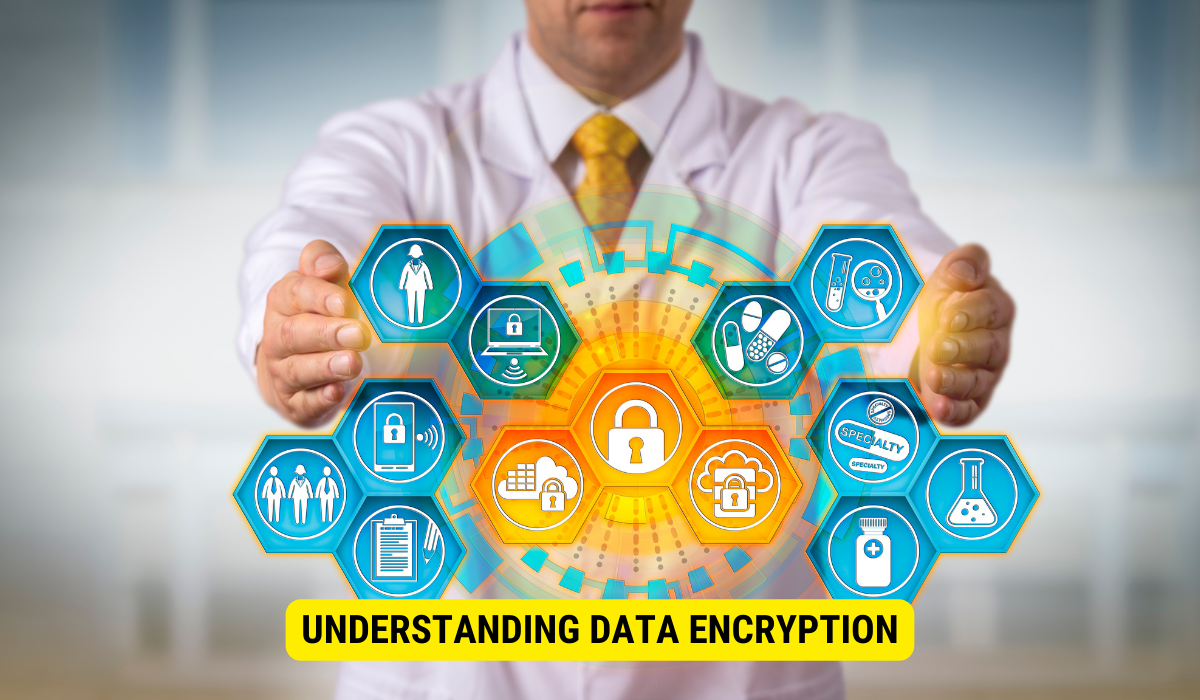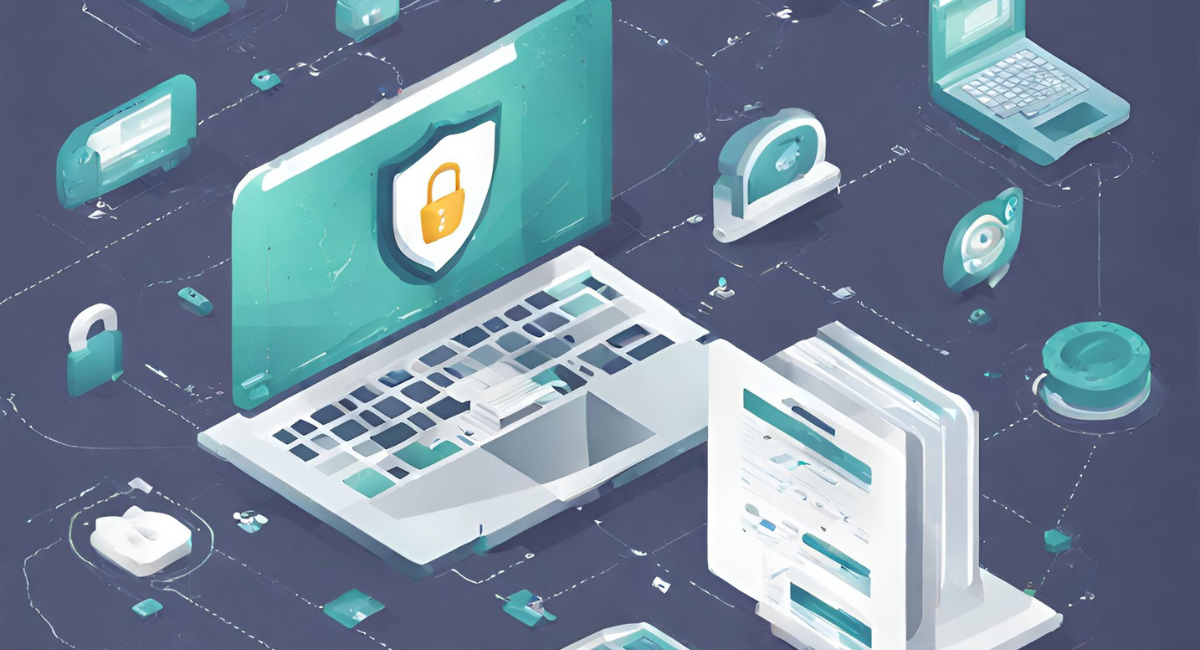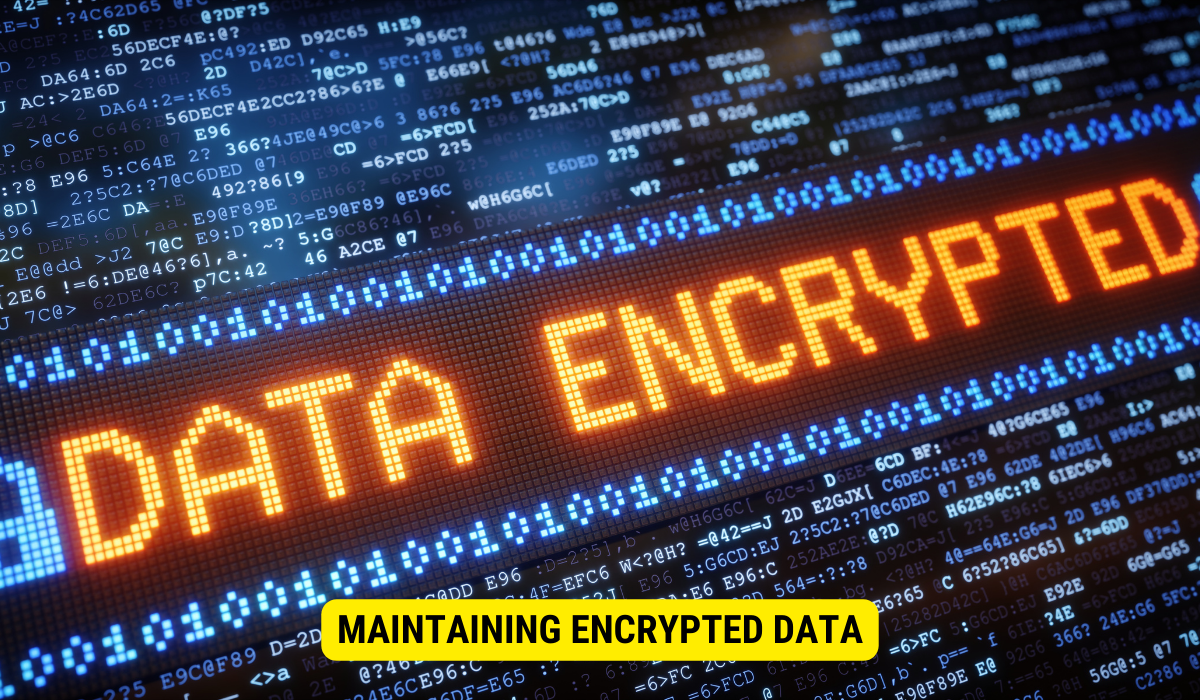Yes, you should encrypt sensitive data on personal devices to protect against unauthorized access, data breaches, and potential misuse of information.
In today’s digital age, where our data is increasingly stored and accessed on personal devices such as smartphones, tablets, and laptops, the question of whether to encrypt sensitive data has become more important than ever. Data encryption is a powerful security measure that can protect valuable information from falling into the wrong hands. Together, we will delve into the world of data encryption, explore the risks of unencrypted data, evaluate the need for encryption on personal devices, and provide guidance on encrypting and maintaining encrypted data.
Understanding Data Encryption

Data encryption refers to converting plain text or data into an illegible format called ciphertext using a series of mathematical algorithms. This ciphertext can only be deciphered by authorized parties who possess the decryption key, effectively safeguarding the information from unauthorized access.
The Importance of Data Encryption
Data encryption plays a crucial role in maintaining sensitive data’s confidentiality, integrity, and privacy. By encrypting data, individuals can prevent unauthorized individuals, such as cybercriminals or hackers, from accessing or deciphering the information, even if it falls into their hands.
One of the key benefits of data encryption is that it delivers an additional layer of security to protect sensitive information. In today’s digital stage, where data breaches and cyber-attacks are becoming progressively common, encryption is essential to confirm that data remains secure and confidential.
Encryption algorithms use complex mathematical formulas to transform data into ciphertext. These algorithms are designed to be extremely difficult to reverse-engineer, making it nearly impossible for unauthorized individuals to decrypt the information without the decryption key.
Moreover, data encryption protects data from external threats and safeguards it from internal breaches. By encrypting data, organizations can limit access to sensitive info, ensuring that only authorized personnel can view or modify it.
Another advantage of data encryption is that it helps organizations comply with many data protection regulations. Many industries like healthcare and finance have strict regulations to protect sensitive data. Encryption is often a requirement to meet these regulatory standards and avoid hefty fines or legal consequences.
Furthermore, data encryption can provide peace of mind to individuals and organizations when transmitting data over insecure networks, such as the Internet. By encrypting data before sending it, individuals can ensure that even if the data is intercepted, it will be useless to anyone without the decryption key.
It is important to note that data encryption is not a foolproof solution. While it significantly enhances data security, it is still vulnerable to certain attacks, such as brute-force attacks or attacks targeting the encryption algorithm. Therefore, it is crucial to implement strong encryption algorithms and regularly update them to avoid potential threats.
In conclusion, data encryption is vital in protecting sensitive information from unauthorized access. It delivers an additional layer of security, helps organizations comply with regulations, and ensures the confidentiality and integrity of data. By understanding the importance of implementing data encryption, people and institutions can proactively protect their data and reduce the vulnerabilities linked to data breaches and cyber threats.
The Risks of Unencrypted Data
Potential Threats to Unencrypted Data
Unencrypted data poses a significant risk as hackers and malicious actors can easily intercept, read, or modify it. These individuals can exploit vulnerabilities to access personal information, financial details, intellectual property, and other confidential data.
Consequences of Data Breaches
Data breaches resulting from unencrypted data can have severe consequences for individuals and organizations. Exposed personal data can lead to identity theft, financial loss, reputational damage, and legal implications. In addition, the losses associated with data breaches can be enormous, including financial costs, damage to customer trust, and potential regulatory penalties.
Let’s take a closer look at the potential threats that unencrypted data faces. When data is transmitted without encryption, it becomes vulnerable to interception by hackers who can easily eavesdrop on the communication channels. These hackers can use various techniques, such as packet sniffing or man-in-the-middle attacks, to gain unauthorized access to the data.
Once the unencrypted data is in the hands of hackers, they can read its contents and extract sensitive information. Individual data, such as names, addresses, social security numbers, and credit card details, can be used for identity theft or sold on the dark web. Financial details, including bank account numbers and passwords, can be exploited to drain funds or commit fraudulent activities.
Furthermore, unencrypted intellectual property risks being stolen or tampered with. Companies that rely on trade secrets or proprietary information can suffer significant financial losses and damage to their competitive advantage if this data falls into the wrong hands. Industries such as pharmaceuticals, technology, and manufacturing are particularly vulnerable to intellectual property theft.
The consequences can be devastating when data breaches occur due to unencrypted data. Individuals with personal information exposed may face a long and arduous process of recovering from identity theft. They may experience financial hardship, struggle to regain their creditworthiness, and spend countless hours resolving fraudulent activities.
For establishments, the fallout from a data breach can be catastrophic. Alongside the financial costs of investigating and mitigating the breach, companies may also face lawsuits from affected individuals or regulatory bodies. The damage to the organization’s reputation can lead to a loss of client trust, resulting in decreased sales and potential business closures.
Furthermore, regulatory penalties can be imposed on organizations failing to protect sensitive data adequately. In recent years, governments worldwide have introduced stricter adherence to data protection regulations, such as the European Union’s General Data Protection Regulation (GDPR) and the California Consumer Privacy Act (CCPA), which is crucial. Disappointment to comply with these laws can lead to substantial consequences and fines, further exacerbating the financial impact of a data breach.
In conclusion, the risks associated with unencrypted data are far-reaching and can have simple consequences for individuals and organizations. It is crucial to prioritize data security by implementing encryption measures to protect sensitive information. By doing so, we can mitigate the risks and safeguard against the potential damages caused by data breaches.
Evaluating the Need for Encryption on Personal Devices
Types of Sensitive Data
Before deciding whether to encrypt sensitive data on personal devices, it is essential to understand the types of data that warrant encryption. Sensitive data can contain personally identifiable information (PII), financial records, medical information, intellectual property, and any data that, if exposed, can cause harm or disruption.
Personally identifiable information (PII) encompasses an extensive variety of data, such as names, addresses, social security numbers, and email addresses. This information, if accessed by unauthorized individuals, can lead to identity theft, fraud, and other hateful activities.
Financial records, including bank statements, credit card info, and investment details, are highly sensitive and attractive targets for cybercriminals. Unauthorized access to such data can result in financial loss, fraudulent transactions, and compromised financial security.
Medical information, such as patient records, diagnoses, and treatment plans, is protected by strict privacy laws. The exposure of this data can violate privacy rights and lead to medical identity theft, insurance fraud, and potential harm to individuals.
Intellectual property, including trade secrets, proprietary algorithms, and research findings, holds immense value for businesses. Encryption of such data is crucial to prevent unauthorized access, theft, and misuse, which can have severe financial and competitive implications.
Assessing Your Risk
Every individual’s risk profile differs, and it is important to assess your risk when deciding whether to encrypt sensitive data. Factors to consider include the value of the data, the likelihood of threats, the potential impact of a breach, and any legal or compliance requirements that may apply.
When evaluating the value of your data, consider the potential consequences of its exposure. For example, if you store personal financial information on your device, the loss or theft of such data can lead to unauthorized transactions, damaged credit scores, and financial hardship.
The likelihood of threats varies depending on various factors, such as your online presence, the security measures you have in place, and the nature of the data you possess. For instance, the risk of interception or hacking increases if you frequently engage in online transactions or share sensitive information via email.
The potential impact of a breach can range from minor inconveniences to significant monetary and reputational damage. Assessing the worst-case scenario can help you understand the importance of encryption in safeguarding your data.
Legal and compliance requirements may also dictate the need for encryption. Certain industries, such as healthcare and finance, have specific regulations that mandate the protection of sensitive data. Failure to comply with these necessities can result in severe penalties and legal consequences.
How to Encrypt Data on Personal Devices?
Encryption Tools and Software

There are various encryption tools and software available that can help individuals encrypt their data on personal devices. These tools often offer user-friendly interfaces, making encrypting files, folders, or entire disks easy. It is important to choose reputable and robust encryption solutions to ensure the effectiveness and security of the encryption process.
Step-by-Step Guide to Data Encryption
When encrypting data on personal devices, following a secure and systematic approach is essential. This includes selecting strong encryption algorithms, creating secure passwords or encryption keys, and properly managing and storing these keys. A step-by-step guide can assist individuals in implementing encryption effectively and efficiently.
Maintaining Encrypted Data

Regular Updates and Encryption Health Checks
Once data is encrypted, it is important to regularly update encryption software to ensure it remains secure against emerging threats. Additionally, periodic encryption health checks can help identify any vulnerabilities or weaknesses in the encryption implementation, allowing for timely remediation.
Best Practices for Keeping Encrypted Data Secure
To maintain the security of encrypted data on personal devices, individuals should follow best practices such as regularly backing up encrypted data, protecting encryption keys, using multi-factor authentication, and being cautious while connecting to unsecured networks. These practices enhance the overall security of encrypted data.
Key Takeaways
- Encrypting sensitive data on personal devices is essential to protect against data breaches and unauthorized access.
- Data encryption transforms plain data into unreadable ciphertext, requiring a decryption key for access.
- Unencrypted data, especially of a sensitive nature, poses significant risks, including identity theft, financial fraud, and reputational damage.
- Implementing encryption on personal devices involves utilizing encryption tools, selecting robust encryption algorithms, and maintaining the encrypted data.
- Regular updates, encryption health checks, and adherence to best practices are essential to ensuring the continued security of encrypted data.
FAQs
What is data encryption?
Data encryption is converting plain text or data into an unreadable format (ciphertext) using mathematical algorithms accessible only by those with the decryption key.
Why is encrypting data on personal devices important?
Encrypting data on personal devices safeguards against unauthorized access, data breaches, identity theft, and potential misuse of sensitive information.
What types of sensitive data might warrant encryption?
Types of sensitive data include personally identifiable information (PII), financial records, medical details, and intellectual property.
How can one encrypt data on personal devices?
Users can employ encryption tools and software to encrypt their devices’ files, folders, or entire disks, ensuring data remains protected.
Is encrypting data a one-time activity?
Maintaining encrypted data involves regular software updates, periodic encryption health checks, and following best practices to keep the data secure.
Conclusion
In conclusion, the decision to encrypt sensitive data on personal devices is prudent. With the increasing risks associated with unencrypted data and the potential consequences of data breaches, encrypting sensitive data can protect valuable information. By understanding data encryption, evaluating the need for encryption, following secure encryption practices, and regularly maintaining encrypted data, individuals can ensure the security and integrity of their sensitive data on personal devices.
